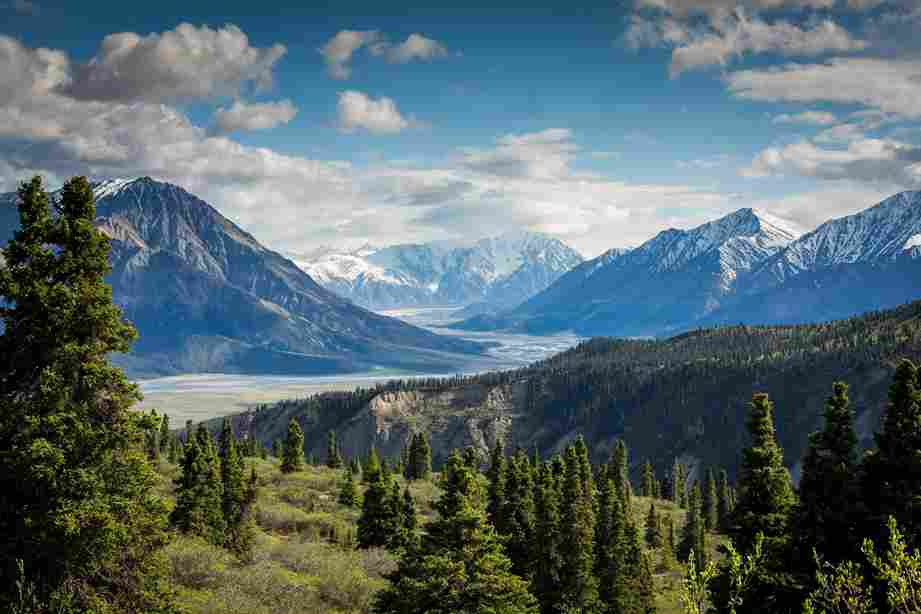
Yukon
Explore Yukon
Yukon
Yukon: Canada’s Untamed Wilderness
The Yukon is a breathtaking region in northwestern Canada, known for its rugged landscapes, stunning mountain ranges, and the magic of the Northern Lights. A paradise for outdoor adventurers, the Yukon offers endless opportunities for hiking, wildlife spotting, and experiencing the rich history of the Klondike Gold Rush. Whether you're exploring the wild tundra, dog sledding through the snow, or soaking in the Midnight Sun, the Yukon is a must-visit destination for nature lovers, history buffs, and off-the-grid travelers alike.
Learn More
Frequently Asked Questions: Yukon
The Yukon’s seasons offer dramatically different experiences:
- June–August (Summer):Best for hiking, road trips, and experiencing the Midnight Sun.
- September–November (Fall):Ideal for stunning autumn colors and early Northern Lights sightings.
- December–March (Winter):Great for dog sledding, winter sports, and the Northern Lights.
- April–May (Spring):A quieter season with emerging wildlife and fewer tourists.
- Whitehorse:The capital city, home to museums, art galleries, and outdoor adventures.
- Kluane National Park & Reserve:A UNESCO World Heritage site with glaciers, grizzly bears, and epic hikes.
- Dawson City:A historic gold rush town with colorful buildings, saloons, and Klondike history.
- Tombstone Territorial Park:A hiker’s paradise with dramatic mountain scenery and tundra landscapes.
- Northern Lights Viewing:Best seen from September to April in remote locations away from city lights.
- Carcross & Emerald Lake:A charming town with a rich Indigenous heritage and the stunning turquoise waters of Emerald Lake.
- Yukon Wildlife Preserve:A fantastic place to see caribou, lynx, muskoxen, and more in their natural habitat.
- Miles Canyon:A scenic canyon with hiking trails and a historic gold rush history.
- Alaska Highway:One of the world’s greatest road trip routes, stretching through the Yukon.
- SS Klondike National Historic Site:A restored sternwheeler showcasing Yukon’s riverboat history.
- Arctic Char:A cold-water fish similar to salmon, often served grilled or smoked.
- Bannock:A traditional Indigenous bread, served sweet or savory.
- Elk & Bison Burgers:A Yukon specialty, offering a taste of the wild.
- Wild Berry Jam:Made from local berries like crowberries, lingonberries, and cloudberries.
- Yukon Gold Potatoes:A famous variety of potatoes originally from the Yukon.
- Smoked Salmon:A staple of the region, often served with bannock or crackers.
- Moose Stew:A hearty dish enjoyed by locals, especially in winter.
- Sourdough Pancakes:A nod to the Klondike Gold Rush, often served with wild berry syrup.
- Birch Syrup:A unique alternative to maple syrup, harvested from Yukon’s birch trees.
- Hot Toddies & Yukon Brewing Craft Beer:Perfect for warming up on a cold day.
- Flights:Arrive at Erik Nielsen Whitehorse International Airport (YXY), the main gateway to the Yukon.
- Car Rentals:The best way to explore the vast landscapes and scenic highways.
- Camper Vans & RVs:Popular for extended road trips and camping adventures.
- Shuttle Services:Available for trips to Dawson City, Kluane National Park, and other key locations.
- Buses:Limited service within the Yukon, mainly for major towns and tourist destinations.
- Dog Sledding & Snowmobiles:A winter alternative for exploring the snowy wilderness.
- For Canadian travelers:No special documents required.
- For U.S. travelers:A valid passport is required for entry into Canada.
- For international travelers:Check Canada’s visa requirements based on your nationality.
- eTA (Electronic Travel Authorization):Required for visa-exempt travelers flying into Canada.
- Currency:Canadian Dollar (CAD).
- Credit cards:Widely accepted in cities and towns, but cash is recommended for remote areas.
- ATMs:Available in Whitehorse and Dawson City, but limited in smaller communities.
- Cash:Useful for small vendors, roadside stops, and remote areas.
- Englishis the primary language spoken.
- Frenchis also an official language but is less commonly spoken in the Yukon.
- Indigenous languages, such as Southern Tutchone and Gwich’in, are part of the region’s cultural heritage.
- Most signs, menus, and information are available in English.
- Respect for Indigenous Cultures:The Yukon is home to 14 First Nations, so cultural respect is important.
- Outdoor Ethics:Follow Leave No Trace principles and respect wildlife.
- Dress for the Weather:Even in summer, temperatures can drop at night.
- Tipping:Common in restaurants (15-20%) and for tour guides.
- Friendly Locals:People in the Yukon are welcoming—don’t be surprised if a stranger strikes up a conversation.
- Restaurants:15–20% tip is standard, but some places include a service charge.
- Bars:$1–2 per drink or 15% of the total bill.
- Hotels:$2–5 per bag for bellhops, $2–5 per night for housekeeping.
- Taxis:Tipping is appreciated but not required.
- Tour Guides & Excursions:$10–20 per person for great service.
- For peak travel season (June–August):Book 6–12 months in advance for accommodations and guided tours.
- For Northern Lights viewing (September–March):Book at least 3–6 months ahead.
- For road trips and RV rentals:Book as early as possible due to limited availability.
- No COVID-19 test is required for entry,but check for updates before traveling.
- Weather conditions can change rapidly—always check forecasts before traveling.
- Some remote areas require special permits or guided access.
Contact us at 281-229-0862or admin@pointmetoparadise.com
